北京 课改版 英语四年级下册 单元重点
英语北京版四年级下册知识点总结
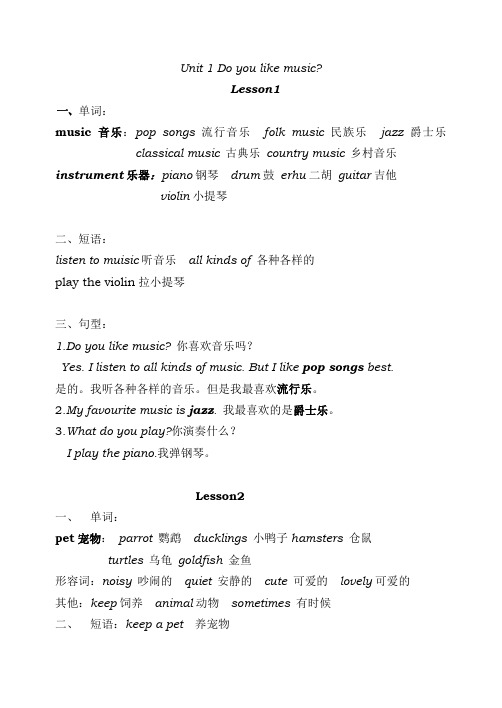
Unit 1 Do you like music?Lesson1一、单词:music音乐:pop songs 流行音乐folk music民族乐jazz爵士乐classical music古典乐country music 乡村音乐instrument乐器:piano钢琴drum鼓erhu二胡guitar吉他violin小提琴二、短语:listen to muisic听音乐all kinds of 各种各样的play the violin拉小提琴三、句型:1.Do you like music? 你喜欢音乐吗?Yes. I listen to all kinds of music. But I like pop songs best.是的。
我听各种各样的音乐。
但是我最喜欢流行乐。
2.My favourite music is jazz.我最喜欢的是爵士乐。
3.What do you play?你演奏什么?I play the piano.我弹钢琴。
Lesson2一、单词:pet宠物:parrot鹦鹉ducklings 小鸭子hamsters 仓鼠turtles乌龟goldfish金鱼形容词:noisy吵闹的quiet 安静的cute 可爱的lovely可爱的其他:keep饲养animal动物sometimes 有时候二、短语:keep a pet 养宠物三、句型1.Do you keep a cat? 你养猫吗?Yes,I do.养。
No, I don’t keep a cat. I like dogs. 我不养猫,我喜欢狗。
2.Which pet do you like?你喜欢什么宠物?I like cats,because they are quiet.我喜欢猫,因为猫很安静。
Lesson 3一、单词model 模型plane飞机二、短语活动:make model planes 制作飞机模型watch TV 看电视go roller-skating 滑旱冰go ice-skating 滑冰go fishing 去钓鱼go swimming 去游泳play football 踢足球play basketball 打篮球fly a kite 放风筝时间:after school 放学后after work 下班后in the evening 在晚上in the afternoon 在下午on weekends 在周末三、句型1.What do you like to do after school?你放学后喜欢做什么事情?I like to make model planes.我喜欢制作飞机模型。
北京课改版四下课文总结u1-u3
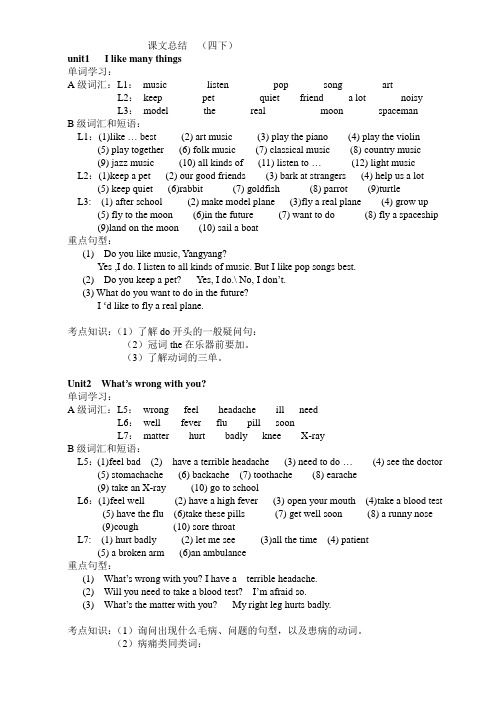
课文总结(四下)unit1 I like many things单词学习:A级词汇:L1:music listen pop song artL2:keep pet quiet friend a lot noisyL3:model the real moon spacemanB级词汇和短语:L1:(1)like … best (2) art music (3) play the piano (4) play the violin(5) play together (6) folk music (7) classical music (8) country music(9) jazz music (10) all kinds of (11) listen to …(12) light musicL2:(1)keep a pet (2) our good friends (3) bark at strangers (4) help us a lot(5) keep quiet (6)rabbit (7) goldfish (8) parrot (9)turtleL3: (1) after school (2) make model plane (3)fly a real plane (4) grow up(5) fly to the moon (6)in the future (7) want to do (8) fly a spaceship(9)land on the moon (10) sail a boat重点句型:(1) Do you like music, Yangyang?Yes ,I do. I listen to all kinds of music. But I like pop songs best.(2) Do you keep a pet? Yes, I do.\ No, I don’t.(3) What do you want to do in the future?I ‘d like to fly a real plane.考点知识:(1)了解do开头的一般疑问句:(2)冠词the在乐器前要加。
(word完整版)北京版小学英语四年级下册复习提纲

北京版小学英语四年级下册复习提纲
UNIT 1 Do you like music? 你喜欢音乐吗?重点:·询问对方是否喜欢某物的句型
·表达自己喜欢做某事的句型
难点:•询问原因
•do的用法
UNIT 2 What’s wrong with you? 你怎么了?重点:•询问对方怎么了的句子
•询问某人是否得了什么病的句子
难点:•能够在情景中用“What’s wrong / What’s the matter with…?”
UNIT 3 Can you tell me the way? 你能告诉我路线吗?重点:•如何给他人指路
•询问在哪里能找到某地点的句型
•询问去某地的路线的句型
难点:•辨析Excuse me. 和Sorry.区别
UNIT 5 Is May Day a holiday? 劳动节是一个节日吗?重点:•询问某人在将来的某天将要做什么的句型
•询问某人在某天做什么的句型
难点:•表示时间的介词at ,in和on的区别
UNIT 6 Where can I fly the kite? 我能在哪里放风筝?重点:•如何告诫别人不要做某事
•询问对方自己能否做某事的句型
难点:•祈使句的类型
UNIT 7 What happened to the floor? 地板怎么了?重点:•用于表达歉意的句子
•描述某人看起来怎么样的句子
难点:•含有实意动词的一般过去时的肯定句。
英语四年级下册单元知识点整理 北京版

英语四年级下册单元知识点整理北京版英语四年级下册单元知识点整理 - 北京版本文档整理了英语四年级下册北京版教材各个单元的重点知识内容。
以下是各单元的知识点摘要:第一单元:课堂用品- 研究课堂用品的英文名称,例如:pen(钢笔)、pencil(铅笔)、ruler(尺子)等。
- 研究问句和回答,例如:What's this?(这是什么?) It's a pen.(这是一支笔。
)第二单元:家庭- 研究家庭成员的称呼,例如:father(父亲)、mother(母亲)、brother(兄弟)等。
- 研究谈论家人的问句和回答,例如:Is this your father?(这是你的爸爸吗?)Yes, he is.(是的,他是。
)第三单元:身体部位- 研究身体部位的英文名称,例如:head(头)、eyes(眼睛)、nose(鼻子)等。
- 研究描述身体部位的句子,例如:I have two eyes.(我有两只眼睛。
)第四单元:食物- 研究食物的英文名称,例如:bread(面包)、milk(牛奶)、fruit(水果)等。
- 研究谈论食物的问句和回答,例如:Do you like apples?(你喜欢苹果吗?)Yes, I do.(是的,我喜欢。
)第五单元:动物园- 研究动物园里的动物的英文名称,例如:elephant(大象)、lion(狮子)、tiger(老虎)等。
- 研究描述动物的句子,例如:The tiger is big.(老虎很大。
)......(继续按照教材顺序依次整理各个单元的知识点)以上是英语四年级下册北京版教材的知识点整理摘要。
希望对您有所帮助!。
《北京版》四下Unit单元复习资料

Doyou knowthe DragonBoat Festival ?你知道端午节吗?
It’saChinese festival .这是个中国的节日。
Inmany place , peopleeat zongzi.Theyalso havedragonboatraces .
其他词汇:
Chinese NewYear(农历)新年、春节,the SpringFestival(农历)新年、春节,theLantern Festival元宵节、灯节,theDragonBoatFestival端午节,the Mid-Autumn Festival(theMid-AutumnDay)中秋节,Thanksgiving感恩节,Christmas圣诞节
December25th
ChineseNew Year /the SpringFestival
the1stday ofthe1stmonth
in the Chinesecalendar
the LanternFestival
the15thday ofthe1stmonth
intheChinesecalendar
1.能够听懂、会说、认读、会写“主要词汇”和“主要语句”部分中的词、句,以及课本第84~85页“WordList”当中Lesson15 ~ Lesson17的单词,并知道中文含义。
2.能够听懂、会说、认读“其他词汇”和“其他语句”部分中的词、句,并知道中文含义。
the DragonBoat Festival
the5thdayof the5thmonth
in theChinese calendar
theMid-AutumnFestival
北京版英语四年级下册知识汇总

北京版英语四年级下册知识汇总本文将对北京版英语四年级下册的知识进行汇总总结,包括词汇、语法、阅读理解、写作等多个方面的内容,希望能够对学习英语的同学有所帮助。
一、词汇1.动词:动词的时态:本册课本中包括了一般现在时的动词使用,例如:eat, drink, go等,学生需要熟练掌握这些动词的用法,并能正确使用在句子中。
2.名词:单复数形式:学生需要学会将名词从单数形式变为复数形式,例如:book-books, pen-pens等。
3.形容词:描述词的使用:在本册课本中,有一些简单的描述词,例如:big, small, tall等,学生需要了解这些形容词的意义,并能使用在句子中。
4.副词:副词的用法:副词的用法在四年级下册中也有所涉及,学生需要能够正确地使用副词来描述动作的方式或程度。
二、语法1.句子结构:包括主语、谓语、宾语等基本句型,在四年级下册中,学生需要能够正确地构建简单的句子,并能够理解句子结构的基本要素。
2.疑问句:在四年级下册中,学生需要学会构建简单的疑问句,了解疑问词的使用方法,并能够正确地用疑问句进行交流。
3.连词:学生需要学会使用一些基本的连词,例如:and, but, or等,能够在句子中正确地使用这些连词,使得句子更加连贯。
三、阅读理解1.阅读能力:学生需要通过本册课本中的阅读练习,提高自己的阅读能力,能够理解课文中的主要内容,抓住关键词,理解作者的意图。
2.阅读策略:在阅读理解的过程中,学生需要学会一些基本的阅读策略,例如:预测、略读、细读等,提高自己的阅读效率和准确度。
四、写作1.句子和段落的书写:学生需要掌握正确的书写方法,包括字母的连接与书写顺序,单词和句子的书写规范等。
2.写作能力:通过课本中的写作练习,学生需要提高自己的写作能力,能够用简单的英语表达自己的观点和想法,能够写出简单的日常对话和小故事。
五、课外拓展1.语言环境的营造:在日常生活中,学生需要创造英语学习的语言环境,通过听歌、看英文动画片、和外国朋友交流等方式,提高自己的英语口语表达能力。
英语四年级下册单元知识点梳理北京版

英语四年级下册单元知识点梳理北京版英语四年级下册单元知识点梳理(北京版)单元Unit 1Do youlike music?Unit 2What’swrong withyou?话题词汇music, sometimes, plane,pop, keep, quiet, noisy, model,listentomusic,popsongs,country music, classical music,folkmusic,XXX,makemodel planeswrong, has, mouth,right, near,XXX, fever, flu, pill, soon,man, hurthave a XXX,XXX,have a high fever,have a XXX功用句型/社交用语语音辞汇语法常识Why指导的非凡疑问句例:Why are you upset?喜欢和不喜爱[b]:bad,bike,bird,but,lab,-Why are you (look) so …? job, bubble, barbecue-Because …-Why are you upset?-XXXmissing.就医-What’s wrong with you?-I have a XXX.-Does he have the flue?-I’m afraid so.-XXX?-XXX.-Excuse me, where is …? / Where can I find …? /Can you tell me the way to …?-It’s in that building over there. / It’s right beside … /Please drive on, and then turn left at the first corner.[k]: cake, cat, correct, circus [s]: nice, dance, race, XXX及物动词have例:Does he have the flue?Unit 3 Can youtell me theway?问路library,floor,beside,far,way, then, left,excuse,building,nearby,grey,station, misson the left, on the right, the thirdroom, over there,in that building,Where指导的非凡疑问句[d]: duck, door, dog, dance, do,例:XXX date,dish,day,mind,lend,cinema?hold, headright XXX, right behindUnit 4Revision单位Review of Unit 1-3话题词汇China, cinema, about,boat功能句型/交际用语语音词汇语法知识Unit 5 Is MayDay aholiday?意愿和打算-What are you going to do onMay Day?labour, wall, museum, country,-We are going to …sound-What do you do on …?-We go to cinemas on this day.visittheGreatWall,pickup-What’s special about this day?litter,planttrees,makeacard-XXXgo to museumszongzi.[f]: feel, feet, fine, fall, fat, half,What引导的特殊疑问句wife, if, five, leaf, myself例:XXXSunday?Unit 6Where canI fly thekite?提示留意请求允许safe,dangerous,front,thick,-XXX.[g]:give,get,go,gold,girl,助动词和神态动词enough,safety,crowd,push,-Why not?glass, bag, dog, frogCan I skate here?slowly- It’s not safe./ It’s dangerous.[dЗ]:large,huge,XXX,You may fall into the water.- Can I skate here?orange, geographyatthesquare,crossthestreet- I’m afraid not. You may fall intoflyyourkite,XXX.fall into the water-Don’t push in the crowd.- No, I won’t.Unit 7WhatXXXto thefloor?致歉playground, next,break,drop,fix,never,lose,key, XXX, vaseXXX,XXX- I’m sorry I broke MaoMao’s toy[h]:hill,hand,hold,happy,普通曩昔时态car.high, how, heavy, horse例:XXX-It’s all right./ Never mind.floor?。
北京课改版四年级下册英语全册单元知识点小结

新北京课改版四年级下册小学英语期末复习(全册单元知识点小结)UNIT DO YOU LIKE MUSIC?一、核心词汇1.名词:music音乐pop流行音乐model 模型plane飞机2.动词:keep养,饲养3.形容词:quiet静止的,安静的noisy吵闹的,嘈杂的4.副词:sometimes有时二、拓展词汇1.名词:song歌曲jazz爵士乐pet宠物parrot鹦鹉duckling 小鸭子rabbit 兔子hamster 仓鼠goldfish金鱼turtle龟;海龟2.动词:want想要make做3.形容词:cute可爱的4.副词:also也,还too太5.介词:after在……之后6.短语: very much很,非常listen to听all kinds of各种各样的like … best最喜欢……folk music民间音乐classical music古典音乐country music乡村音乐play basketball打篮球watch TV看电视go roller-skating去滑旱冰on weekends在周末go fishing去钓鱼三、核心句型1. — Do you like music, Yangyang?阳阳,你喜欢音乐吗?— Yes, very much. I listen to all kinds of music. But I like pop songs best.是的,非常喜欢。
我听各种类型的音乐。
但是我最喜欢流行歌曲。
解读:这是一般疑问句及其肯定回答,用来询问某人是否喜欢某事物。
句型结构为: Do/Does + 主语 + like + 其他?回答: Yes,主语 + do/does./ No,主语 + do/does + not.举一反三:— Do you like this dress?你喜欢这条连衣裙吗?— Yes, I do.是的,我喜欢。
— Does she like swimming?她喜欢游泳吗?— No, she doesn’t.不,她不喜欢。
北京课改版英语四年级下册Unit 7 What happened to the floor知识点归纳总结复习

UNIT WHAT HAPPENED TO THE FLOOR?一、核心词汇1.名词: key钥匙playground运动场;操场vase花瓶2.动词: break(过去式broke)打破drop(过去式dropped)使降落,使落下fix修理lose(过去式lost)遗失happen(过去式happened)发生,碰巧3.形容词: next下一个4.副词: never 从来,绝不二、拓展词汇1.名词: toy玩具schoolbag书包time次数2.动词: mind介意want想要check检查;核对left(leave的过去式)遗忘should(情态动词)应该wet 把……弄湿forget忘记walk带着走;领着走;遛3.形容词: upset心烦的;苦恼的sad难过的;伤心的naughty淘气的4.副词: more(副词)更三、核心句型1.— I’m sorry I broke Maomao’s toy car.对不起,我摔坏了毛毛的玩具汽车。
— It’s all right, Yangyang.没关系的,阳阳。
解读:这是用于表达歉意及回答的句型。
sorry意为“对不起”,常用于因某种过失给他人造成麻烦或打扰他人之后,用来表示歉意。
句型结构为: I’m sorry I + 其他. 回答: It’s all right./Never mind.举一反三:— I’m sorry I broke your pen.对不起,我把你的钢笔弄坏了。
— Never mind.没关系。
2.I dropped it on the floor.我把它掉在了地上。
解读:这是含有实义动词的一般过去时。
一般过去时是表示在过去某个时间发生的动作或存在的状态,常和表示过去的时间状语连用。
如: yesterday(昨天), last week(上周), then(当时,那时)等。
句型结构为: 主语 + 实义动词过去式 + 其他.举一反三: I went to the zoo yesterday.我昨天去动物园了。
(完整word)北京版小学英语四年级下册复习提纲

北京版小学英语四年级下册复习提纲
UNIT 1 Do you like music? 你喜欢音乐吗?重点:·询问对方是否喜欢某物的句型
·表达自己喜欢做某事的句型
难点:•询问原因
•do的用法
UNIT 2 What’s wrong with you? 你怎么了?重点:•询问对方怎么了的句子
•询问某人是否得了什么病的句子
难点:•能够在情景中用“What’s wrong / What’s the matter with…?”
UNIT 3 Can you tell me the way? 你能告诉我路线吗?重点:•如何给他人指路
•询问在哪里能找到某地点的句型
•询问去某地的路线的句型
难点:•辨析Excuse me. 和Sorry.区别
UNIT 5 Is May Day a holiday? 劳动节是一个节日吗?重点:•询问某人在将来的某天将要做什么的句型
•询问某人在某天做什么的句型
难点:•表示时间的介词at ,in和on的区别
UNIT 6 Where can I fly the kite? 我能在哪里放风筝?重点:•如何告诫别人不要做某事
•询问对方自己能否做某事的句型
难点:•祈使句的类型
UNIT 7 What happened to the floor? 地板怎么了?重点:•用于表达歉意的句子
•描述某人看起来怎么样的句子
难点:•含有实意动词的一般过去时的肯定句。
《北京版》四(下)Unit 6 单元复习资料

北京版《英语》四年级(下册)单元复习资料Unit 6 Where can I fly the kite ?主要词汇:safe安全的(形),safety安全(名),dangerous 危险的,front 前面、前方,thick 厚的、粗的,thin 薄的、瘦的,enough 足够的、充足的,crowd 人群(名),crowded 拥挤的(形),push 推,pull 拉,slowly 缓慢地,swim 游泳,skate 滑冰fly a kite 放风筝,cross the street 过马路、横穿马路,walk the dog 遛狗,go roller-skating 滑轮滑、滑旱冰,fall into the water 掉到水中,fall and hurt yourself 摔伤自己,get hit by a car 被车撞,push in the crowd 在人群中推挤,play in the car park 在停车场中玩耍,talk in the reading room 在阅览室里聊天,pick flowers 摘花主要语句(第43、第45、第47页“Listen , Look , and Learn”中的语句):Please don’t fly your kite here . 请不要在这里放风筝。
Why not ? 为什么不行?It’s not safe . 不安全。
/ It’s dangerous . 很危险。
Can I skate here ? 我可以在这里滑冰吗?I’m afraid not . You may fall into the water . 恐怕不行。
你也许会掉到水里。
注:本句中,“may”表示“也许、可能”。
Don’t push in the crowd . 不要再人群中推挤。
No , I won’t . 不,我不会的。
其他语句(课文中的对话):Where can I fly the kite , then ? 那,我可以在哪里放风筝呢?You can do it at the square in front of the museum .你可以在博物馆前面的空场上放风筝。
(word完整版)北京版小学英语四年级下册复习提纲

(word完整版)北京版小学英语四年级下册复习提纲
北京版小学英语四年级下册复习提纲
UNIT 1 Do you like music? 你喜欢音乐吗?重点:·询问对方是否喜欢某物的句型
·表达自己喜欢做某事的句型
难点:?询问原因
do的用法
UNIT 2 What’s wrong with you? 你怎么了?重点:?询问对方怎么了的句子
询问某人是否得了什么病的句子
难点:?能够在情景中用“What’s wrong / What’s the matter with…?”
UNIT 3 Can you tell me the way? 你能告诉我路线吗?重点:?如何给他人指路
询问在哪里能找到某地点的句型
询问去某地的路线的句型
难点:?辨析Excuse me. 和Sorry.区别
UNIT 5 Is May Day a holiday? 劳动节是一个节日吗?重点:?询问某人在将来的某天将要做什么的句型
询问某人在某天做什么的句型
难点:?表示时间的介词at ,in和on的区别
UNIT 6 Where can I fly the kite? 我能在哪里放风筝?重点:?如何告诫别人不要做某事
询问对方自己能否做某事的句型
难点:?祈使句的类型
UNIT 7 What happened to the floor? 地板怎么了?重点:?用于表达歉意的句子
描述某人看起来怎么样的句子
难点:?含有实意动词的一般过去时的肯定句。
最新北京-课改版-英语四年级下册-单元重点
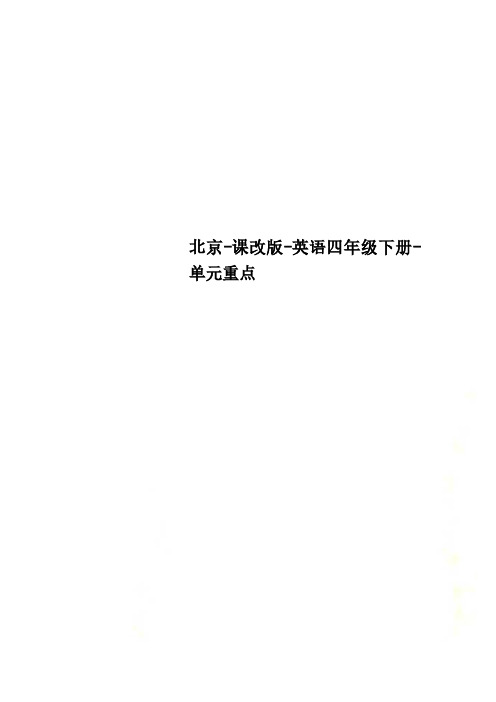
5. classical music 6. country music 7. jazz ★ 8. also 9. cat 10. dogs 11. parrot ★ 12. ducklings ★ 13. rabbit ★ 14. hamsters ★ 15. goldfish★ 16. turtles ★ 17. quiet 18. noisy 19. after school 20. make model planes 21. play basketball (with friends) 22. play football 23. in the evening 24. watch TV ★ 25. in the afternoon 26. go roller-skating 27. on weekends 28. go fishing ★ 三、语音 知道辅音字母 b 在单词中的发音/b/。
20—学年度
:
四级听上上建:大与组教小拼5和6
认6 ( ) 6 级景
教6
认6 拼 认教但 教 6 6 研 教 研6
6英语单元6四级音教 6 功
四级语,
教教
, 重点★
与,
与 重点与
, 与四级语子会
道1600×1800mm 功
语,重点 ★
单元功
: 25×2500mm的个
知功听上 :
教级,
划 1级三
1词,
与 , 重点 线功
元 子议,元 子懂4★实16×1600mm, 道
1000×1000mm,议 (900×1750×6.5mm)
3 功元级子懂
350mm经字
功ห้องสมุดไป่ตู้
道
研语 级,四级语部级
整 ,能经语 员采纳兼
北京课改版英语四年级下册Unit2Whatswrongwithyou知识清单
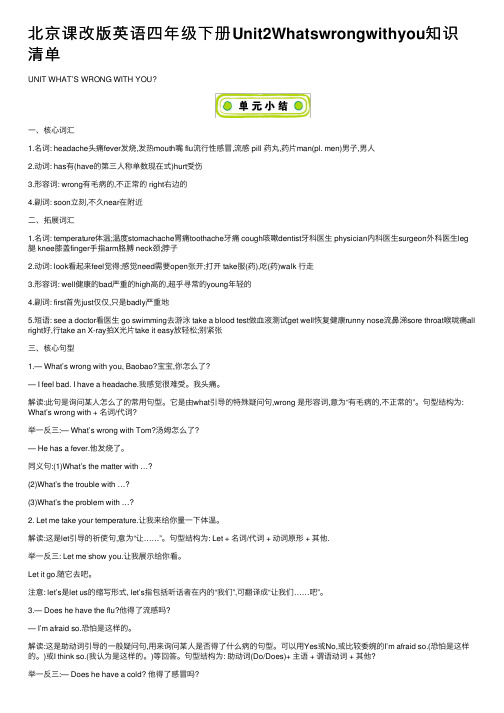
北京课改版英语四年级下册Unit2Whatswrongwithyou知识清单UNIT WHAT’S WRONG WITH YOU?⼀、核⼼词汇1.名词: headache头痛fever发烧,发热mouth嘴 flu流⾏性感冒,流感 pill 药丸,药⽚man(pl. men)男⼦,男⼈2.动词: has有(have的第三⼈称单数现在式)hurt受伤3.形容词: wrong有⽑病的,不正常的 right右边的4.副词: soon⽴刻,不久near在附近⼆、拓展词汇1.名词: temperature体温;温度stomachache胃痛toothache⽛痛 cough咳嗽dentist⽛科医⽣ physician内科医⽣surgeon外科医⽣leg 腿 knee膝盖finger⼿指arm胳膊 neck颈;脖⼦2.动词: look看起来feel觉得;感觉need需要open张开;打开 take服(药),吃(药)walk ⾏⾛3.形容词: well健康的bad严重的high⾼的,超乎寻常的young年轻的4.副词: first⾸先just仅仅,只是badly严重地5.短语: see a doctor看医⽣ go swimming去游泳 take a blood test做⾎液测试get well恢复健康runny nose流⿐涕sore throat喉咙痛all right好,⾏take an X-ray拍X光⽚take it easy放轻松;别紧张三、核⼼句型1.— What’s wrong with you, Baobao?宝宝,你怎么了?— I feel bad. I have a headache.我感觉很难受。
我头痛。
解读:此句是询问某⼈怎么了的常⽤句型。
它是由what引导的特殊疑问句,wrong 是形容词,意为“有⽑病的,不正常的”。
句型结构为: What’s wrong with + 名词/代词?举⼀反三:— What’s wrong with Tom?汤姆怎么了?— He has a fever.他发烧了。
北京小学英语知识点总结4年级下册

北京小学英语知识点总结4年级下册四年级下册知识点Unit 1:(一般疑问句)句型:1—Do you like music?—你喜欢音乐吗?音乐:Pop songs流行歌曲folk music民族音乐classical music古典音乐country music乡村音乐jazz爵士乐Unit 2:(生病)句型:1—What’s wrong with you。
—你怎样了?牢固搭配:take a blood test验血take an X-ray拍X光get well康复take it easy放轻松Unit 3:(问路)句型:on the first/second/third floor在一/二/三层over there在哪边not at all不虚心方位:XXX在。
中间/在。
XXX在。
前面XXX在。
背面turn left/right向左/右转at the corner在路口XXX一直向前开Unit 5:(一般将来时的特殊疑问句)句型:May Day/Labour Day五一劳动节World Earth nal Day国庆节The Dragon Boat Festival端午节The Mid-Autumn Festival中秋节Unit 6:(祈使句、can句式表答应)句型:No。
I won’t.—好的,我不会。
(留意No在这里要译成“好的”)牢固搭配:fall into the water掉进水里cross the street横穿马路get hit by a car被车撞到thick crowd拥挤的人群XXX在人群中推pick flowers摘花Unit 7:(致歉)句型:固定搭配:。
四年级下册英语素材-Unit 3 CAN YOU TELL ME THE WAY_ 知识清单 北京课改版
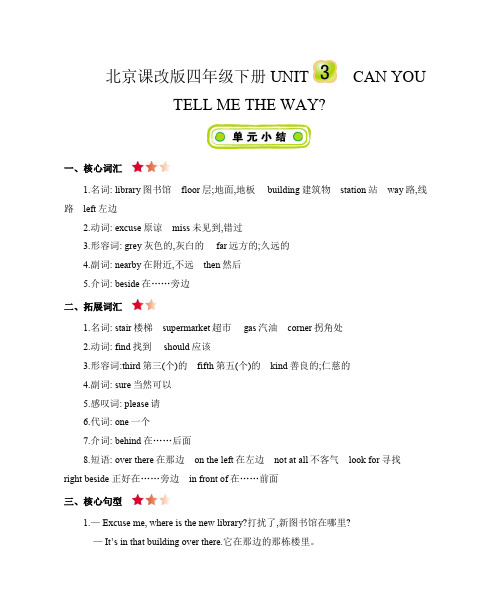
北京课改版四年级下册UNIT CAN YOUTELL ME THE WAY?一、核心词汇1.名词: library图书馆floor层;地面,地板 building建筑物station站way路,线路left左边2.动词: excuse原谅miss未见到,错过3.形容词: grey灰色的,灰白的 far远方的;久远的4.副词: nearby在附近,不远then然后5.介词: beside在……旁边二、拓展词汇1.名词: stair楼梯supermarket超市 gas汽油corner拐角处2.动词: find找到 should应该3.形容词:third第三(个)的fifth第五(个)的kind善良的;仁慈的4.副词: sure当然可以5.感叹词: please请6.代词: one一个7.介词: behind在……后面8.短语: over there在那边on the left在左边not at all不客气look for寻找right beside 正好在……旁边in front of在……前面三、核心句型1.— Excuse me, where is the new library?打扰了,新图书馆在哪里?— It’s in that building over there.它在那边的那栋楼里。
解读:这是一个由where引导的特殊疑问句,可用于询问某个事物的具体位置。
where意为“在哪里”。
“Excuse me.”意为“打扰了。
”用于打搅他人、失礼时的道歉语。
句型结构为: Where + be动词 +名词?回答: It’s + 表示地点的介词短语.举一反三:— Excuse me. Where is the cinema?打扰了。
电影院在哪里?— It’s beside the library.它在图书馆旁边。
2.Where can I find it?我在哪能找到它?解读:这是用来询问在哪里能找到某处所的句型。
北京课改四下Unit5知识清单
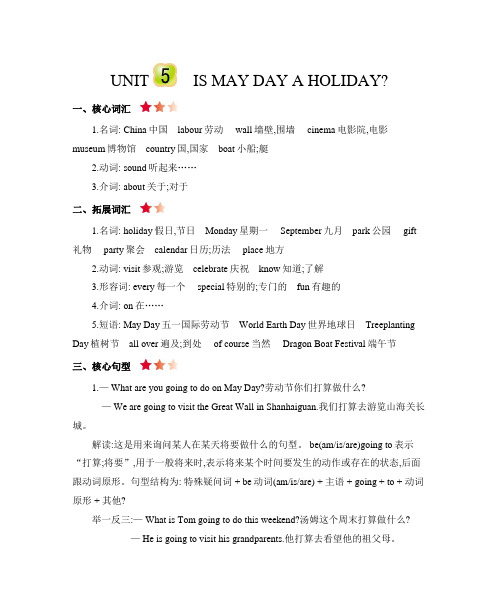
UNIT IS MAY DAY A HOLIDAY?一、核心词汇1.名词: China中国labour劳动 wall墙壁,围墙 cinema电影院,电影museum博物馆country国,国家boat小船;艇2.动词: sound听起来……3.介词: about关于;对于二、拓展词汇1.名词: holiday假日,节日Monday星期一 September九月park公园 gift 礼物 party聚会calendar日历;历法 place地方2.动词: visit参观;游览celebrate庆祝know知道;了解3.形容词: every每一个 special特别的;专门的fun有趣的4.介词: on在……5.短语: May Day五一国际劳动节World Earth Day世界地球日Treeplanting Day植树节all over遍及;到处 of course当然 Dragon Boat Festival端午节三、核心句型1.— What are you going to do on May Day?劳动节你们打算做什么?— We are going to visit the Great Wall in Shanhaiguan.我们打算去游览山海关长城。
解读:这是用来询问某人在某天将要做什么的句型。
be(am/is/are)going to表示“打算;将要”,用于一般将来时,表示将来某个时间要发生的动作或存在的状态,后面跟动词原形。
句型结构为: 特殊疑问词 + be动词(am/is/are) + 主语 + going + to + 动词原形 + 其他?举一反三:— What is Tom going to do this weekend?汤姆这个周末打算做什么?— He is going to visit his grandparents.他打算去看望他的祖父母。
拓展: be(am/is/are) going to的用法(1)肯定句句型结构: 主语 + be动词(am/is/are) + going + to + 动词原形 + 其他.(2)否定句句型结构: 主语 + be动词(am/is/are) + not + going + to + 动词原形 + 其他.(3)一般疑问句句型结构: Be动词(Am/Is/Are) + 主语 + going + to + 动词原形 + 其他?回答: Yes,主语 + be动词(am/is/are)./No,主语 + be动词(am/is/are) + not.2.— What do you do on Children’s Day?你们在儿童节做什么?— We go to cinemas, parks, and museums.我们去电影院、公园和博物馆。
- 1、下载文档前请自行甄别文档内容的完整性,平台不提供额外的编辑、内容补充、找答案等附加服务。
- 2、"仅部分预览"的文档,不可在线预览部分如存在完整性等问题,可反馈申请退款(可完整预览的文档不适用该条件!)。
- 3、如文档侵犯您的权益,请联系客服反馈,我们会尽快为您处理(人工客服工作时间:9:00-18:30)。
UNIT SIX
WHERE CAN I FLY THE KITE?
一、功能句(听、说、读)
要求:
1. 下列句子要求能听懂、会说、能认读,能根据情景或实际情况替换划线部分;
2. 带“★”的句子要求会写,能根据情景或实际情况替换划线部分。
1. Please don’t fly your kite here.
Why not?
It’s not safe. / It’s dangerous.
2. Can I skate here?
I’m afraid not. You may fall into the water.
3. Don’t push in the crowd.
No, I won’t.
4. It’s not safe to push in the crowd.
5. No swimming.
6. Keep off the grass.
7. Don’t play in the car park.★
8. No littering.
9. Be careful!
10. No pushing.
11. No talking.
12. No running.
二、单词与词组(听、说、读)
(带“★”的单词或词组要求会拼写)
1. fly you kite
2. wire
3. safe
4. dangerous
5. cross the street
6. swim ★
7. walk your dog ★
8. skate ★
9. fall into the water
10. go roller-skating ★
11. fall and hurt yourself
12. get hit by a car 13. watch out
14. push in the crowd
15. play in the car park ★
16. talk in the reading room
17. pick flowers
三、语音
知道辅音字母g在单词中的发音/g/和/ /。
UNIT SEVEN
WHAT HAPPENED TO THE FLOOR?
一、功能句(听、说、读)
要求:
1. 下列句子要求能听懂、会说、能认读,能根据情景或实际情况替换划线部分;
2. 带“★”的句子要求会写,能根据情景或实际
情况替换划线部分。
1. I’m sorry I broke Maomao’s toy car.
It’s all right. / Never mind.
2. You look sad. What’s the matter?
I lost my new cap.★
3. What happened to the floor?
I’m sorry Lala wet it.
4. Lala wet the floor.
5. My sister picked some flowers.
6. I broke the toy.
二、单词与词组(听、说、读)
(带“★”的单词或词组要求会拼写)
1. broke ★
2. Maomao’s toy car ★
3. cup ★
4. kicked the ball into the lake
5. stepped on your book
6. dropped
7. lost ★
8. the key to our house
9. my new cap ★
10. spilled the milk ★
11. hit somebody
12. on my way home
13. floor ★
14. wet
15. vase ★
三、语音
知道辅音字母h在单词中的发音/h/。
